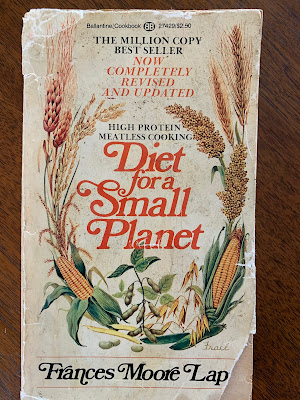My days as a chef were short. They were out of necessity more than anything else. I had two daughters to feed.
My staple recipes came from Frances Moore Lappe's small paperback book, Diet for a Small Planet, the 1975 copyright edition, The original copyright was 1971.
I didn't need glasses to read the tiny print, which now appears fuzzy and impossible to discern without a pair of spectacles. I still own the same book. A couple of the recipes have remained family favorites over the years. Namely, Clam Spaghetti and Monastery Lentils.
When first published, Lappe's book "virtually created the publishing category of food politics and turned [her] into what she once self-deprecatingly called, "the Julia Child of the soybean circuit," according to a recent piece in the New York Times https://www.nytimes.com/2021/11/20/style/frances-moore-lappe-diet-small-planet.html about the author and the 50-year anniversary of her little book that created a big shift toward our approach to sustainable food.
It's a vegetarian cookbook with emphasis on whole grains and fresh vegetables. The recipes are simple and the resulting dishes healthy, emphasizing complimentary protiens. Not being a strict vegetarian, I incorporated Italian sausage into Lappe's recipe for whole-wheat and soy flour pizza.
I haven't made that pizza crust in years.
I did make the Clam Spaghetti dish for my dear Mother-in-Law during a trip to Southern California a few yeas ago. She loved it, or so she told me. Perhaps what she really loved was having me cook for her for a change.
Understanding how adventuresome she is about food, I had given her a copy of Diet some time before that, but the latest edition did not contain the recipe for Clam Spaghetti.
Thanks to Frances, I was able to provide healthy meals to my daughters. The book has always had a special place in our kitchen, and in my heart.
Following is from the recent New York Times article:
'[Diet for a Small Planet] was published during 'a very idealistic time for American youth... There was also this idea of the personal is political. Her book filled the blanks.'
Today, a similar desire for personal and planetary health pervades the culture. There's been such a consciousness shift around food that fast-food restaurants new serving plant-based burgers, and climate change activists are once again calling for cutting consumption of beef, though for different reasons, including its outsize impact on greenhouse gas emissions.
Surveying the current landscape, Lappe mentioned with approval the proliferation of community and school gardens and the thousands of farmers' markets around the country. 'These didn't exist 50 years ago.'
But Ms. Lappe is troubled by the way healthy eating has become an elitist activity, saying of $12 green smoothies, 'That's not what I'm all about at all.' She's also ambivalent about plant-based meats made in a lab. While they contribute less to climate change, they are not a solution to fixing our broken food system.'
'It keeps processed foods as our staple. The answer is healthy foods that come directly from the earth, or as close as possible.'
Nowadays people seem to eat much better, and much worse. Processed foods loaded with sugar dominate the supermarket shelves, and nearly 1 in 7 Americans now have diabetes. 'Food is life itself -- and we've turned it into a killer. It's jaw-dropping.'
I feel very grateful to have had a mother who cooked from scratch. And my wife Barbara has continued the same tradition.
Recipe for Clam Sauce with Garlic and Wine from Diet for a Small Planet copyright 1975:
avg. serving = approx. 12 g usable protein, 28-34% of daily protein allowance
Start cooking:
1/2 lb spaghetti
Drain juice from 2-3 8 oz cans minced clams and set aside
Saute'
1/4 cup olive oil
2 cloves garlic minced
Stir in:
clam juice
3/4 cup chopped parsley
2 tbsp white wine
1 tsp basil
1/2 tsp salt
dash pepper
Now add clams and heat through while you drain the spaghetti. Serve over spaghetti. A special dish that is no trouble at all! For a feast include garlic bread and Caesar salad.

